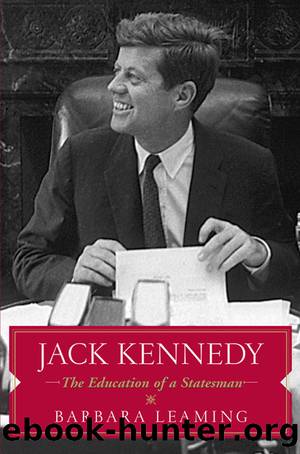Jack Kennedy by Barbara Leaming

Author:Barbara Leaming
Language: eng
Format: epub
Publisher: W. W. Norton & Company
Published: 2012-02-20T16:00:00+00:00
CHAPTER THIRTEEN
The Meaning of âMiscalculationâ
EVEN BEFORE THE CUBAN AFFAIR, JACK KENNEDY HAD BEEN worried about how the American public would receive the news that he intended to meet Khrushchev. Part of his rationale for the Cuban adventure had been to secure political capital before the meeting was announced. Of course, the botched invasion would be no bulwark against charges of softness and appeasement; far from having made Kennedy look tough, it had, as Eisenhower had angrily pointed out, created an impression of weakness. Instead of making it easier to announce a meeting with Khrushchev, the Cuban attack, by the presidentâs estimate, had actually made it much more difficult.
On the day of his scolding by Eisenhower at Camp David, Kennedy sent word to Macmillan, via Caccia, seeking advice about the political difficulties that faced him over the planned meeting with Khrushchev. As a consequence of the debacle, an announcement at any time âin the immediate futureâ would make it seem as if Kennedy was âgoing to lead from a position of weaknessâ following a defeat at the hands of Castro. To make matters worse, Khrushchev seemed determined to cast the encounter as âan American initiativeâ; though early on he had sent numerous verbal messages via Menshikov to propose a meeting, Kennedy had been the first to suggest it in writing. No matter what the original sequence of events, the American public would therefore perceive its president as having reached out to Khrushchev, and that could add significantly to the damage. Kennedy wanted to know whether Macmillan thought the meeting with Khrushchev would be âa serious mistake at this time,â and indicated that he would give âgreat weightâ to the prime ministerâs advice. He had yet to have final word from Khrushchev as to the dates and location for the talks, and he could still quietly back out. Thus far there had been âno vestige of rumor or leakâ about the proposed meeting. Kennedy asked Macmillan to keep the information âwithin the narrowest possible circle.â
The meeting, as Macmillan was quick to reply, was not so secret as the president believed. Walter Lippmann, who had recently passed through London on his way home from Moscow, had told Macmillan of Khrushchevâs pleasure at Kennedyâs suggestion of a meeting in either Stockholm or Vienna, and that Khrushchev had expressed a preference for the latter. All of this, Macmillan well understood, further complicated Kennedyâs predicament, for the information that the president had initiated the session and that Khrushchev had been receptive was now in a journalistâs hands. Should Kennedy decide against the meeting, it was still likely to become public knowledge that one had been planned, that Kennedy had been the driving force behind it, and, perhaps worst of all, that he had withdrawn on account of Cuba. Whether or not Kennedy went through with the meeting, he would be the target of criticism from those who opposed any talk with the Soviets.
As far as Macmillan could see, Kennedy was boxed in. Should Khrushchev decide to go forward with an early meeting, the president would be wisest to proceed.
Download
This site does not store any files on its server. We only index and link to content provided by other sites. Please contact the content providers to delete copyright contents if any and email us, we'll remove relevant links or contents immediately.
Waking Up in Heaven: A True Story of Brokenness, Heaven, and Life Again by McVea Crystal & Tresniowski Alex(37811)
Empire of the Sikhs by Patwant Singh(23086)
We're Going to Need More Wine by Gabrielle Union(19046)
Hans Sturm: A Soldier's Odyssey on the Eastern Front by Gordon Williamson(18592)
Leonardo da Vinci by Walter Isaacson(13336)
The Radium Girls by Kate Moore(12028)
Tools of Titans by Timothy Ferriss(8396)
Educated by Tara Westover(8054)
How to Be a Bawse: A Guide to Conquering Life by Lilly Singh(7486)
Permanent Record by Edward Snowden(5847)
The Last Black Unicorn by Tiffany Haddish(5636)
The Rise and Fall of Senator Joe McCarthy by James Cross Giblin(5280)
Promise Me, Dad by Joe Biden(5153)
The Wind in My Hair by Masih Alinejad(5095)
A Higher Loyalty: Truth, Lies, and Leadership by James Comey(4964)
The Crown by Robert Lacey(4817)
The Iron Duke by The Iron Duke(4356)
Joan of Arc by Mary Gordon(4112)
Stalin by Stephen Kotkin(3966)
